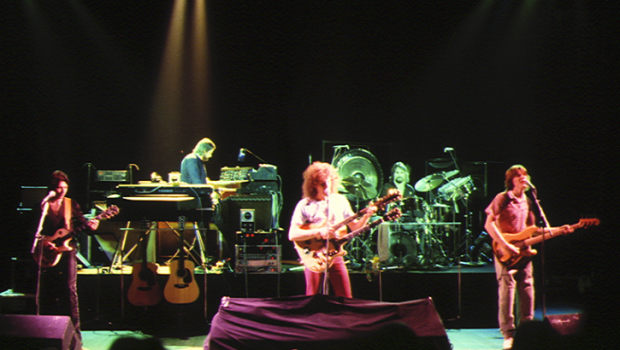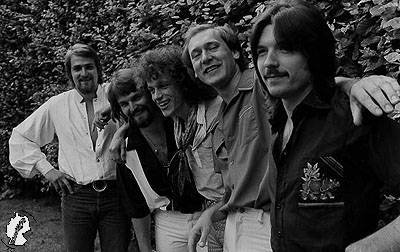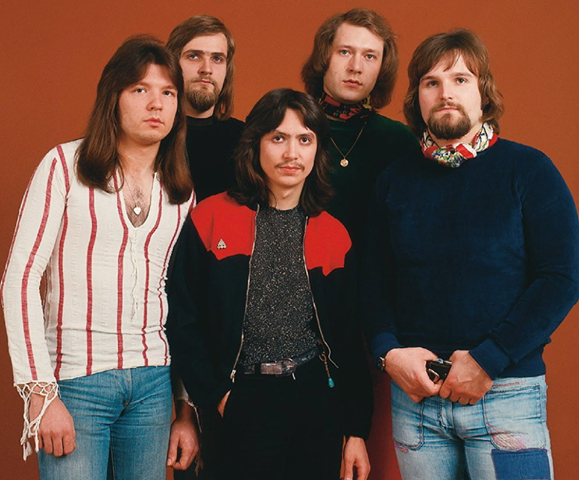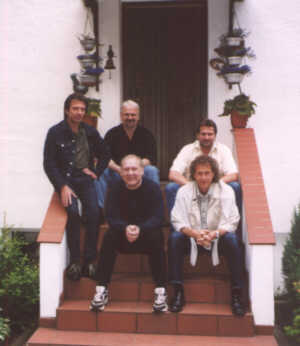As a follow up to his recent review of Novalis‘ Schmetterlinge box set, TPA’s Basil Francis took the opportunity to speak to Lutz Rahn and Hartwig Biereichel.
Hello, Lutz Rahn and Hartwig Biereichel. It’s a privilege to be able to speak to you. I hope you both are well.
Hartwig Biereichel: Yes, we are!
Last year, the Schmetterlinge box set, containing every Novalis album, was released. How does it make you feel to see all your work with the band in one place?
HB: Well, I’m very proud! It feels like there is a big part of my life in one box. To remember each year I only have to decide which CD I should listen to. And the best thing is the sound of the careful and powerful remastering of Eroc.
Were you consulted in the design of this box set?
HB: Not only consulted – it was entirely designed by us; all the photos, cover artwork and lyrics were supplied by us, with Matthias Mineur writing the liner notes. We spent over a year working on it.
Who do you think this box set is aimed at?
HB: To everybody, especially those who recognise the band from the ’70s and are interested to hear us again with better sound quality and more background information. I actually don’t think all that many people have ever heard of Novalis… But who knows?
When did you begin playing the keyboards/drums?
HB: As far as I can remember, I started playing drums in 1966. I saw the Beatles live at Hamburg at one of their last live performances. I was totally overwhelmed, and not only because of Ringo. They played their music so well live, it was as though I was listening to the vinyl. They were so ‘together’ – that was my ‘thing’ and I knew at once I had to buy a drum set and find some musicians.
Lutz Rahn: In 1957, I started piano lessons. After 7 years, I was more interested in improvisation and stuff like House of the Rising Sun so my mother let me quit the lessons. Now I wish I’d continued them!
What music did you listen to as teenagers?
HB: After that Beatles show I tried to go to as many concerts as my low salary as an apprentice would allow me. I remember Led Zeppelin (especially John Bonham), Yes (Bill Bruford was fabulous), Jimi Hendrix, Gentle Giant, Genesis, Pink Floyd, a very remarkable King Crimson show and many others. I also listened to Frank Zappa, John McLaughlin etc. because my friends told me I had to – but I didn’t like them as much.
LR: The Beatles, Rolling Stones, Traffic, Spencer Davis, Deep Purple, Yes, Led Zepplin, Procol Harum, Pink Floyd, Ekseption, Brian Auger, Jimmy Smith, the Nice, but also Ludwig van Beethoven, Anton Bruckner, Camille Saint-Saens as well.
Do you each have a favourite Novalis song?
HB: As a drummer I always preferred uptempo songs like Frühsport Im Sachsenwald and Vielleicht Bin Ich Ein Clown?, but of course Banished Bridge, Sommerabend and Brandung are our best-known songs from the first half of the ’70s.
LR: I have plenty of favourites: All of Banished Bridge because of the wildness on that album. Du Bist schön, Abschied, Mit Den Zugvögeln, Blauer Morgen (which was the demo as I recorded it on my vacation in Denmark), Als Kleiner Junge (a very intimate story of my childhood), Keiner Kann Gewinnen because of the calm/tenderness and emotional power. Atlanto, Grenzen, Sphinx, Frühsport because of the energy, and the list goes on…
How did Novalis form?
HB: In 1970, bass player Heino Schünzel and singer Jürgen Wenzel both played in a ‘Top 40’ band and didn’t want to go further with commercial music like that. So they placed an announcement in Hamburg’s biggest newspaper searching for a keyboard player and a drummer.
Was Novalis the original band name?
HB: No, the first name was ‘Mosaik’ because of the different backgrounds we came from – Lutz Rahn played jazz-rock and I played songs by Santana, Hendrix and so on. Lutz and I had never played our own songs before. But sometimes we noticed that there was a TV show called ‘Mosaik’ on Saturdays, aimed at the older generation. We changed immediately to ‘Novalis’ only because of the good sound of this name. We knew of the poet Novalis, but there was no deeper meaning in choosing this name.
When did you first hear the term “progressive rock” being applied to your music?
HB: Immediately after the release of Banished Bridge in 1973. Press biographies and other material were made by our record company Metronome – and we simply were not asked. They called us “the German answer to Pink Floyd” – and today I’m not proud of this. But, of course, we were influenced by bands like Floyd, Yes and so on – but I’m convinced that we didn’t really try to copy them. ‘Progressive Rock’ was the mainstream at that time and all young bands were going in that direction.
Why did you originally choose to sing in English on Banished Bridge (and other early tracks), then sing in German for every other album?
HB: Very easy: singer Jürgen Wenzel, who only appeared on Banished Bridge, had written the lyrics by himself for this album. Later, in 1974, we had completed the tracks for the second album Novalis in English as well – but there was a split between Jürgen and ourselves. So we had no vocalist and Detlef Job and Heino Schünzel had to take over singing responsibilities. But, fortunately, we met producer and artist Achim Reichel, who was formerly with the Rattles. He had the idea of singing German lyrics just to help both Heino and Detlef.
Did singing in German set you apart from other German progressive bands?
HB: As far as I can remember, there were other bands singing in German, although it was rare. Ton, Steine, Scherben and Ihre Kinder are a couple that spring to mind. But we definitely were the most successful of these bands in the first half of the ’70s.
Who were your musical influences when you wrote the Banished Bridge, Novalis and Sommerabend albums?
LR: Brian Auger, Jimmy Smith (I came from a rock-jazz trio), Keith Emerson, Rick van der Linden, Beethoven and Bruckner.
Whose idea was it to incorporate Novalis’s poetry from the 18th Century into your music? Did you ever have that idea before naming the group?
HB: Before naming the group we knew the name of this poet. Achim Reichel had the idea to incorporate the poetry. We always felt that this decision was the best thing we had done – it was the ‘Pünktchen auf dem I’, the icing on the cake!
How did Fred Mühlböck come to join the group?
HB: Both Heino and Detlef were not really happy with their ‘singing’ jobs, and we also felt the band looked a bit harmless without having a ‘showman’ on stage. So we started auditions again searching for a singer who also played instruments. That was in 1975, and the band now had a big name. There really were a lot of applications, but we only listened to and discussed this one cassette with only one song on it. Fred Mühlböck’s warm and intimate voice just had what we needed – and fortunately, he was also good looking, a good guitar player and played the flute very well.
Irgendwo, irgendwann marks a significant step for Novalis away from progressive rock and towards a more commercial sound. Did the record label push you to make a ‘hit’ or was that an artistic decision?
HB: No, they didn’t. As far as I can remember, it was just a regular song that we composed around that time. Of course, this song also helped us to get on radio stations. We always heard that they liked our songs but were unable to play them ‘on air’ because of their length.
How would you explain the band’s move from long compositions to shorter more accessible tracks between 1976 and 1980?
HB: Well, that’s a very important question and I have thought a lot about it in the last few years. To be very clear, today I personally prefer our early period of ‘long compositions’ and I think that was the period of being a real prog rock band. During the first half of the ’70s, we had long sessions of composing songs together, starting from nothing and working on ideas as a group.
In the second half of the ’70s, Lutz, Fred and Detlef started working with multi-channel recorders at home and were able to produce good demos of their compositions. After one year of being the singer of Novalis, Fred Mühlböck had a greater influence in the band by composing more songs, sometimes together with Lutz. This influence was still growing by the beginning of the ’80s when we recorded a lot of songs written by him. I should explain that this move was totally O.K. by me – it was a natural development although we realised that this was not the music some of the old fans were expecting. But we were looking for new directions and didn’t want to copy ourselves. The other reason was the total musical change in Germany from ‘serious music’ to Neue Deutsche Welle/NDW. That was just the opposite of what we had done before.
LR: That’s a key question for me: In the late seventies, the age of the 20-minute song was over. The commercial success became part of the game, the record labels pushed the band to make more radio-friendly, short, hit tracks. Later, Achim Reichel went to court to get the copyrights for one more album. The result was Bumerang. Finally, the label insisted on Christoph Busse as producer and hit writer. Nach Uns Die Flut is more a Busse album than a Novalis album.
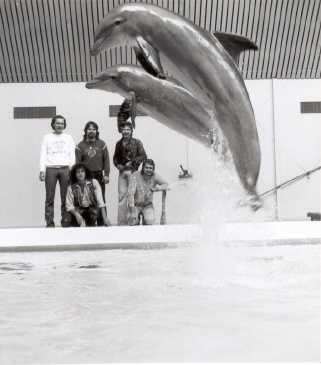 Flossenengel is a very special album, much more complex and contemplative than the previous album Vielleicht bist Du ein Clown?. Can you explain the concept of the album and the message you were trying to send?
Flossenengel is a very special album, much more complex and contemplative than the previous album Vielleicht bist Du ein Clown?. Can you explain the concept of the album and the message you were trying to send?
LR: The awareness of topics like environmental protection, deforestation, the Amoco Cadiz disaster and a starting relationship with Greenpeace and the WWF gave us the idea of creating a concept album around these matters.
After Vielleicht bist Du ein Clown?, Flossenengel feels more like one of the older albums, in terms of its complexity and prog rock feel. Would you agree with this?
HB: Yes, I would! In my eyes, …Clown was the summit of both our prog and commercial sides all at once. At that time, the songs from that album were very successful live.
The following album Augenblicke is very different once again. How was the reception to this album after Flossenengel?
HB: After the concept album Flossenengel, we felt that it was time to work with all the ‘shorter’ ideas we had in mind. In those days, we had to produce one album a year and Augenblicke worked well for us. The Flossenengel live performances were very successful and yet we were also pleased with the stuff we wrote for Augenblicke. Thinking about those years, I realise that we always liked to begin a new direction after having success with the last endeavour – maybe because of the fear that critics might say “they only copy themselves”?
What made bassist Heino Schünzel quit the band after that album?
HB: He had a problem with the general development of the band and wanted to play shorter songs like Supertramp did.
Heinz Fröhling from Schicke Führs Fröhling would take his place on Neumond. Had you listened to any of their albums before he joined?
HB: As Label Manager for the Metronome BRAIN-Label, I knew Heinz very well and signed SFF to the company. Additionally, he was and is a nice guy and a really fantastic musician – even still. We really played well together. He wasn’t just a bass player, he was a good acoustic guitar player as well. The two-man band Führs & Fröhling opened for Novalis several times during the late ’70s, and Heinz would change his clothes after their show and then play fantastic bass with us. As you know, the bass player and the drummer have to be very good together – and this was very easy with Heinz. To me, it was better than with Heino – although he was and is a good fellow!
Why did Fred Mühlböck leave as well?
HB: That was for very personal reasons. I think he was never very happy with his personal life, especially living in Germany after leaving Austria. Maybe, if he hadn’t met Novalis, he would have gone back much sooner. Today we are good friends again, and he told me that bad critics always made him very angry and sad. And, after having a tragic car crash, he decided to leave Germany forever.
What caused the band to split after Nach uns die Flut?
HB: Well, we really had the situation of ‘das war’s! Fred had left the band, new singer Ernst Herzner really was a very good rock shouter, but not the best decision for us. Additionally, we were not successful with our new company Phonogram and had a lot of issues with our producer that we had to work with. So it was clear that we had to give it up. Also, our guitar player Detlef Job had just moved after the last concert in October 1985 and married a Japanese girl.
Interestingly, the two most recent live albums Novalis Lebt! and Letztes Konzert 1984 both focus on the commercial era of the band. Do you think Novalis is remembered more as a progressive band or a commercial band?
LR: To me, Novalis is mostly remembered with Sommerabend and Wer Schmettelinge Lachen Hört. During the early years, we simply did not have any facilities for live recordings.
HB: We decided not to release the ‘old’ stuff again in newer live albums. They were released on the Konzerte album and we felt there was no chance of making it better. By the way, Konzerte really is the best selling album we have – although it was produced really cheaply just by recording directly from the mixer and two microphones to get the atmosphere. But that is the reason for the record sounding so great – it was the optimal thing at the optimal time in 1977.
In Schmetterlinge, you include a 2006 song Block Rock from American rapper Ghostface Killah, which samples Dronsz. There are actually quite a few hip-hop artists that have sampled your music over the years. Why was Block Rock chosen for inclusion with this set?
LR: We included this track because nobody else asked us for permission to sample our music!
HB: Because it belongs to the story of Novalis! I personally don’t like the song very much and am not proud of this. But it’s interesting that a hip-hop artist sampled our music – and he is not the only one; Drake might be the most famous person who sampled our music, in his song Star67.
Eroc of the legendary German group Grobschnitt remastered the entire Schmetterlinge boxset. Did you listen to Grobschnitt back in the ’70s?
HB: Yes, of course, I listened to Grobschnitt but no too intensively. We played some festivals together, always us playing after them. That was a nightmare for us because they didn’t care about rules or contracts! I remember one special open air when their showtime was from 20:00 to 22:00. It was getting cold that night and we were staying in a tent without any heater. They ended up playing until 01:00 a.m., by which time we were angry and nearly frozen, and our audience had gone home! Today I can laugh about these memories! I always felt that they did a show like comedians or clowns do, although Lupo was a very good guitar player and when they were live they played their Solar Music so well! That’s the only song I remember. What I really admire is that they played (like us) every ‘Currywurst-Bude’ in Germany, and their audience was getting bigger any time they came again.
HB: Regarding Eroc, I do have a good anecdote. Since he was deeply interested in recording, even in 1974, he did a naughty thing. When we played a concert in his hometown Hagen, he installed two discrete mics and recorded us playing Impressionen without permission. Twenty years later, when we both were really friends, Lutz and I decided to release this song as a bonus track on the Novalis album (both vinyl and CD), and that’s what you hear today! And from that time on I always trusted him to do our complete remastering on all reissues – there’s no one who can compare to him. Please listen to this track again – it’s unbelievable that there are only two mics!
Would there ever be a Novalis reunion concert?
HB: Definitely not! Why should we destroy everything that fans are remembering? Even the question itself sets me on edge.
HB: It’s absolutely impossible to recall that ’70s feeling again, and the interest is not large enough to seriously consider it. And, don’t forget we are all around 65 now and that’s not a good age to enter the rock stage again after more than 30 years. But that’s only my personal opinion. I am very well, just not interested. Additionally, Fred would never be doing this and without him it’s senseless. Only Lutz is playing Hammond organ in a band today beside his job as a studio owner and producer.
What is next for you both?
LR: I am still writing, playing, arranging and producing music.
HB: To live! And sometimes remember the old days… but not too often!
LINKS
Novalis – Band History (in German)

